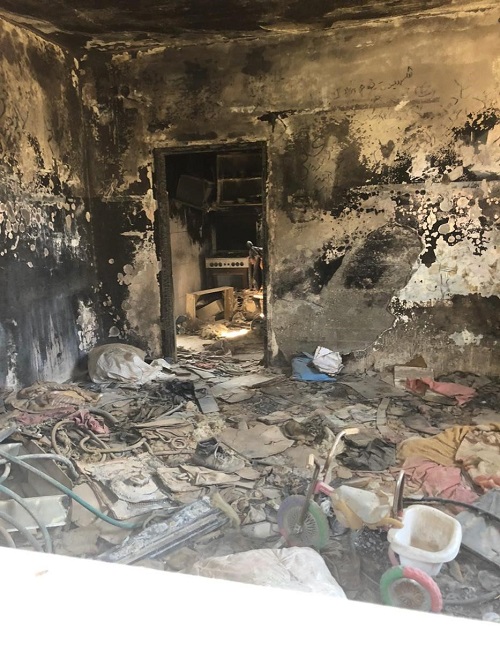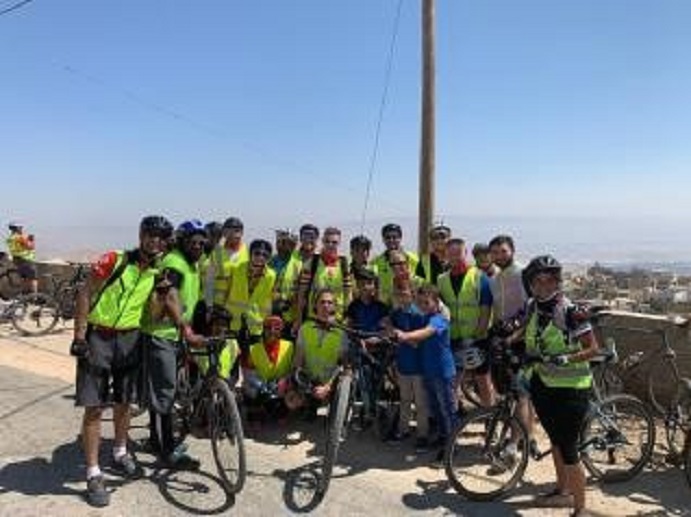“Cycle Palestine for Medical Aid for Palestinians was the most challenging thing I’ve ever done physically, mentally and emotionally”
Middle East Monitor / October 19, 2019
Cycle Palestine for Medical Aid for Palestinians was the most challenging thing I’ve ever done physically, mentally and emotionally. It was a life changing experience – a complete rollercoaster of highs and lows for so many reasons yet before even leaving on the last day I was already making plans to return!
People ask me why I wanted to go to Palestine and why I couldn’t just be happy raising money for MAP by cycling from the north to the south of the UK. My motivations were so much more than cycling and just raising money. For me it was about learning and understanding more about the situation there, the history and the current reality. It was about raising awareness and being able to come back and talk about the experience. Sharing solidarity with the kind-hearted people and experiencing the beautiful country and culture of our brothers and sisters in humanity.
I completely underestimated the physical challenge which was six days of cycling a total of 240 kilometres – a gruelling 40 kilometres each day. Whilst the distances may not have seemed too impressive, the conditions were something I’ve never experienced – relentless, long climbs up hills with steep gradients, over 45 degree heat, no shade, broken roads, potholes, gravel paths, traffic and cars that are not used to cyclists to mention a few of the hurdles. However, MAP did a stellar job of keeping us all safe!
Our route took us from Jenin in the north to Hebron in the south, staying in a different city each night. Some of the highlights for me were the ride from Taybeh 850 metres above sea level down to Jericho via the Dead Sea, which was 200 metres below sea level. It was an exhilarating day of downhill coasting with a salty dip in the sea at the end!
The next day we travelled from Jericho to Bethlehem starting at the Nabi Musa – where the Prophet Moses is believed to be buried. Cycling three hours through the desert and then trekking another three hours to the stunning Saint Sabbas Monastery carved into a rock face surrounded by the desert. It was over 48 degrees that day with no shade – I’d never experienced anything like it, but the beauty of the desert was totally worth enduring the heat! Visiting the Church of the Nativity in Bethlehem was also a real highlight seeing the spot where Jesus was born and all the pilgrims coming from all over the world to visit.
Hebron – where the Prophet Abraham is buried – was another spectacular site punctuated by a visit to the Ibrahimi Mosque. We ended our journey in Jerusalem, a truly magical place where I felt as though I was transported back in time thousands of years. It was mind blowing to see the site that holds so much meaning for Christians, Jews and Muslims.

I felt very safe in the West Bank. However, it was clear that for the locals life is extremely tough. One of the most emotionally difficult experiences was seeing the remains of the Dawabsheh family home in Duma. In 2015, extremist Jewish Israeli settlers set fire to the family’s home, orphaning Ahmed – who was four years old at the time – and killing his parents and baby brother, Ali. Ahmed now lives with the trauma of what he witnessed not to mention the burns and constant operations relating to his physical injuries.
The visit to Hebron was also very heavy; it is a very bleak example of what was once a bustling market town turned into a ghost town with a decimated economy as a result of illegal settlements. It served as a reminder of the hardships Palestinians in the West Bank face to survive.
The Separation Wall, which snakes through the West Bank traveling into Bethlehem, also highlighted the limitations faced by Palestinians. The imposing structure completely dominated the landscape; on one side of it were refugee camps like Aida in which thousands of Palestinians live in underdeveloped homes and communities, where there is little space for growth forcing families to dangerously build upwards. On the other side of the wall, green fertile areas spread across the landscape bringing to light the important role that natural resources, like water, have to play in this conflict.
Our cycling route took us through the desert and Bedouin villages, which were no more than a few corrugated metal roof structures. It was heart-breaking to see people living in the middle of nowhere in the desert without access to clean running water – something we all take for granted! When asked why they don’t leave the area, they said settlers had repeatedly targeted them and so they were protecting their land to stop settlers claiming it.
Despite their struggles the locals were so wonderfully hospitable and generous, taking an interest in what we were doing, cheering us on along the road side with happy honking and even bringing us fresh dates and baking fresh bread for us during our pit stops. Children joined us for parts of the ride bringing a much needed boost of energy to our journey.
I was also able to see the remarkable work that MAP does on the ground including the mobile health unit that regularly visits Bedouin villages and provides people with access to basic healthcare in areas where they don’t have access to water or the means to visit hospital. MAP also provides emergency relief, support for women and children including first aid training and works to on ensuring provisions for those with disabilities, mental health issues and so much more. I’m really pleased to have raised over £5,500 ($6,950) for MAP with the knowledge that the donations are going to a great cause. If you’d like to donate you can do so here.
The part of the trip that I didn’t expect was the amazing group that joined me on the ride. I hadn’t met many of them before we travelled out together and I was absolutely blown away by the diversity of the group. They ranged in age from 20-68, male and female, different ethnicities, races, abilities and professions from students to doctors, business corporates to restaurant owners and everything in between! It was amazing that such a diverse group of people were united by a shared and common humanity and solidarity with the Palestinian people. The whole experience, the country, the people, the culture, the food, was so incredible and humbling and I feel so privileged to have been able to experience it in the way that I have, so much so, I am making plans to return next year!













